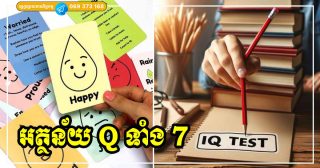The Meaning of the 7 Types of “Q”: IQ, EQ, CQ, MQ, PQ, AQ, and SQ
Here’s a breakdown of the seven types of Quotients (Q) that define not just intelligence, but emotional, social, and practical life success:
1. IQ (Intelligence Quotient)
IQ measures your ability to:
Think critically
Analyze information
Perform calculations
Reason logically
It represents cognitive intelligence — the kind most commonly measured through academic tests.
2. EQ (Emotional Quotient)
EQ refers to your ability to:
-
Recognize and understand your own emotions
-
Sense and empathize with others’ emotions
Manage and express emotions appropriately
Show patience, adapt to rules and discipline
Maintain a positive outlook on life
Practicing the Four Divine States (Metta — loving-kindness, Karuna — compassion, Mudita — sympathetic joy, and Upekkha — equanimity) can significantly improve your EQ.
3. CQ (Creativity Quotient)
CQ is the measure of your:
Creative thinking abilities
Imagination
Innovation in various forms, such as play, art, and inventiveness
Research shows that engaging in activities that stimulate creativity — like storytelling, crafting, and imaginative play — can greatly enhance CQ.
4. MQ (Moral Quotient)
MQ represents your:
Moral intelligence
Sense of ethics and social responsibility
Honesty, accountability, and integrity
Even if someone has a high IQ and EQ, without a strong MQ, their intelligence can be misused.
Thus, many religious and ethical teachings emphasize moral cultivation as the foundation of being a truly good and respected human being.
5. PQ (Play Quotient)
PQ is the intelligence developed through:
Play and recreational activities
Building physical, emotional, creative, and social skills through playful engagement
Parents play a crucial role in nurturing their children’s PQ by actively participating in play —
and it’s often said, “Parents are the best toys for their children.”
6. AQ (Adversity Quotient)
AQ measures your:
Ability to face and overcome difficulties
Resilience and adaptability
Persistence in solving problems and enduring challenges
Having a high AQ means seeing obstacles as opportunities rather than defeats —
and developing the mindset to keep moving forward without giving up easily.
7. SQ (Social Quotient)
SQ refers to your:
Social intelligence
Ability to interact harmoniously with others
Empathy, consideration, and effective communication skills
Living well in society means relying on mutual cooperation and respect.
It requires:
Being open-minded
Listening to others’ viewpoints
Maintaining mutual respect and avoiding conflicts
🎯 Final Insight
Researchers today confirm that IQ accounts for only about 20% of success in career and education.
Thus, relying solely on IQ is not enough.
Developing EQ, CQ, MQ, PQ, AQ, and SQ is essential for living a truly successful and happy life in today’s world.
Source:
Chhon Kimkanikar (ឆន គីមកណិការ)










